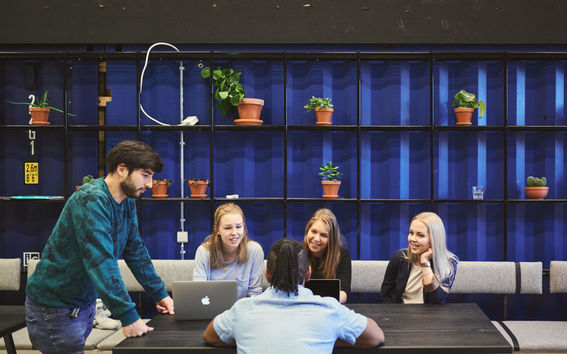Challenge-based learning is an approach for enriching the learning experience

Challenge-based learning is an approach used to bring work-life relevance to teaching and learning. Challenges from companies, public sector and society are integrated deeply into the teaching and learning through collaboration with real-life partners. Challenge-based learning is a call for action for students and partners to collaborate with current themes.
Project-based, problem-based and design-based learning has become increasingly popular in higher education. Challenge-based learning at Aalto University draws from the aforementioned approaches combining their characteristics into a learning model, which incorporates real-life challenges provided by partners into teaching in a multidisciplinary way. An exhaustive definition for challenge-based learning could be: “learning is organised in a collaborative manner around real-life challenges and is carried out in student-led projects provided by external partners.”
Challenge-based learning offers many possible benefits from establishing new teaching and learning practices which are aligned with work-life environments and increasing employability for students. Authentic learning experiences allow students to explore, discuss, and meaningfully construct concepts and relationships in contexts that involve real-life challenges and projects that are relevant to the learner.
1. Engage with your networks to find relevant challenges
Building partnerships with industries, companies, the public sector and NGOs is the core of designing challenge-based learning. The challenge-based learning approach enables the creation of a co-learning environment, where the learner is the students, the teacher and the partners. Value-adding collaboration brings benefits for all participants.
Even though challenge-based learning can be organised as one-off events, ideally they are an integrated part of degree programmes. It is crucial to consider continuity and scalability at the initial stages of planning. By doing so, it can be guaranteed that longer-term partnerships can be built and the impact can be measured.
Engage with your contacts and networks in different industries and organisations. Many partners want to work specifically with university students - to get out-of-the-box ideas for innovation, to find the most suitable talent for recruitment purposes and to engage and collaborate with society at large.
2. Start planning your course well ahead of time
Be prepared to use more resources for organising challenge-based learning as part of your course or programme. Designing challenge-based learning starts with understanding the bigger picture, what is the purpose of the course or activity, how does it benefit the students, how does it benefit the collaborators and what are the intended outcomes. The learning experience that you are designing might be an individual one-off course or event or it might be an integrated building block of a whole degree programme.
The preparation phase is very underlined in the process of challenge-based learning. All the phases in the process must be seen in relation to each other. When all aspects of the learning experience are well organised and happen in a planned sequence, it is easy for partners to get involved in the learning process and students have the freedom as well as the support to find unique ways of solving challenges.
3. Plan the appropriate scope with the partner
The objectives of challenge-based learning are best met when the project which students are working on during the learning experience comes from the real world. Usually, the project is commissioned by a partner: company, public sector organisation, NGO, etc. When thinking about prospective partners, there is no need to necessarily limit the choice to a specific industry – as long as the commissioned project is in line with the intended learning outcomes.
What should be taken into consideration when planning the scope with the partner:
- clear vision and description of the learning experience (intended student product, schedule)
- the role of the partner (participation fee, deliverables, meeting schedule)
- the scope of the project (in terms of the level of students, size of student teams, number of working hours expected for study credits, level of support from faculty and staff, intended learning outcomes)
Determining the project scope is the responsibility of the teacher. Many factors need to be taken into account when agreeing on project terms with the partner. Partners tend to have high expectations on the student product and sometimes unrealistic expectations of competences of students, level of motivation of students, the number of working hours committed to the project, etc. It is advised to set a tight scope rather than a vast scope. It is much easier to widen the project than to narrow it, possibly affecting both the students and the partner in a negative way.
4. Prepare students for the challenge
Preparing the students for the challenge is crucial for success. Before embarking on the challenge students should be offered teaching and tools for working in teams, project management, collaborating and communicating with external partners, etc. Learning project management skills in an essential part of the challenge-based learning process. Building in components of project management into the learning experience serves two purposes: students learn project management skills in action, and students are more likely to finish the project when well managed.
Consider the structure of the student project teams so that it serves the purpose of the learning experience in the best possible way. Student teams can be formed in different ways:
- student teams are predetermined based on project needs and individual competencies
- student teams are organised based on students’ preferences
- student teams are self-organised

Students teams should have access to collaborative workspaces both online and offline. A good platform for collaborating within a challenge-based project is Microsoft Teams, which can be accessed both by faculty and students under the Aalto University license.
5. The modern teacher has many hats
Remember to allow students to take ownership of the challenge. Students need a certain amount of freedom to explore, experiment and create during the challenge-based learning process. Keep in mind that the role of the teacher is to keep the larger picture in mind and the discipline context and communicate that to the students during the challenge-based learning process. Knowing the evolving role of the teacher is key – resist the temptation to define the solution for the students. The modern teacher has many hats: lecturer, information expert, knowledge collaborator, facilitator, project manager and coach.
The teacher has the role of promoting team culture, being challenging, help students to manage the tasks and show process and enable them to move towards innovative thinking. In order to help the students learn how to manage the team, the educator might have to engage with complex issues relating to team dynamics, personalities and diversity.
About the author
Laura Sivula works as the Head of Aalto Summer School and as a Program Director at the Department of Information and Service Management for the Information Technology Program (ITP) and Digital Business Master Class. She is the Strategy Lead for Teaching Lab and believes that work-life relevant education is a must-have for any higher education institution. Laura has worked with companies and partners with co-learning initiatives at Aalto University for many years.
Read more news

Stop applying for jobs and build your own startup instead at Ignite
Applications for the Ignite summer accelerator program 2026 are open. Apply by March 8.
Environmental Structure of the Year 2025 Award goes to Kalasatama-Pasila tramway
The award is given in recognition of meritorious design and implementation of the built environment. Experts from Aalto University developed sustainability solutions for the project.
The runway for an entrepreneurial journey: students’ 13-week sprint into startup reality
Aalto Founder Sprint is a growth-entrepreneurship training program tailored for ambitious students. Two participants in the very first Sprint, Oliwia Kaczmarek and Emil Pekkinen, share what they learned in 13 weeks about building a company and about themselves.






